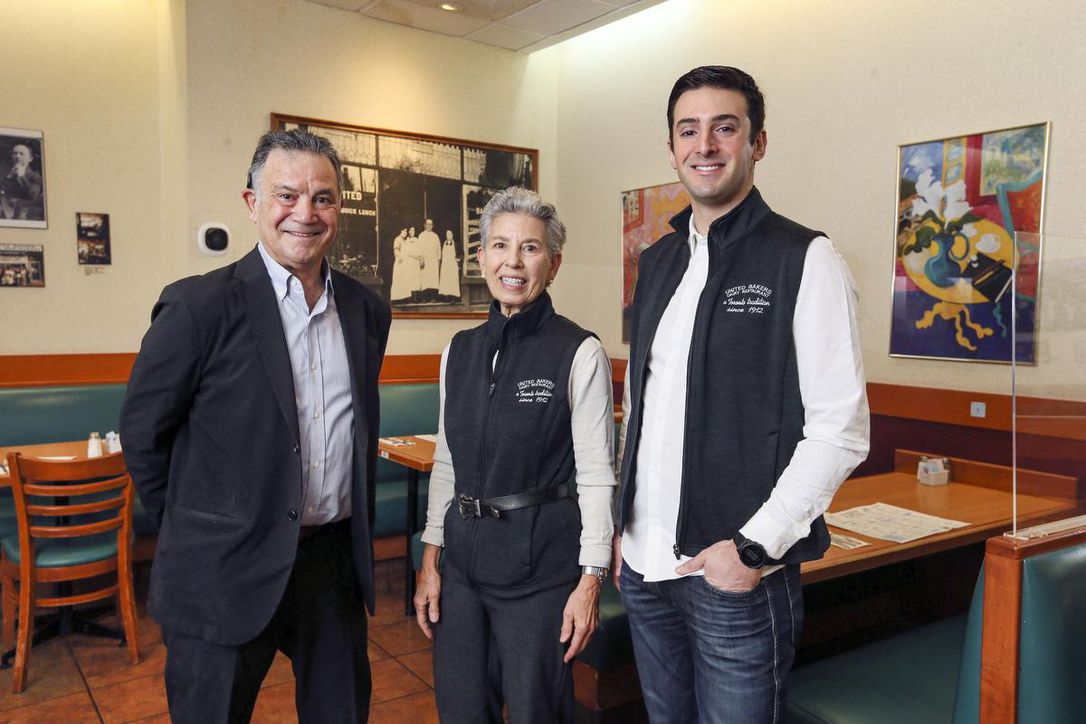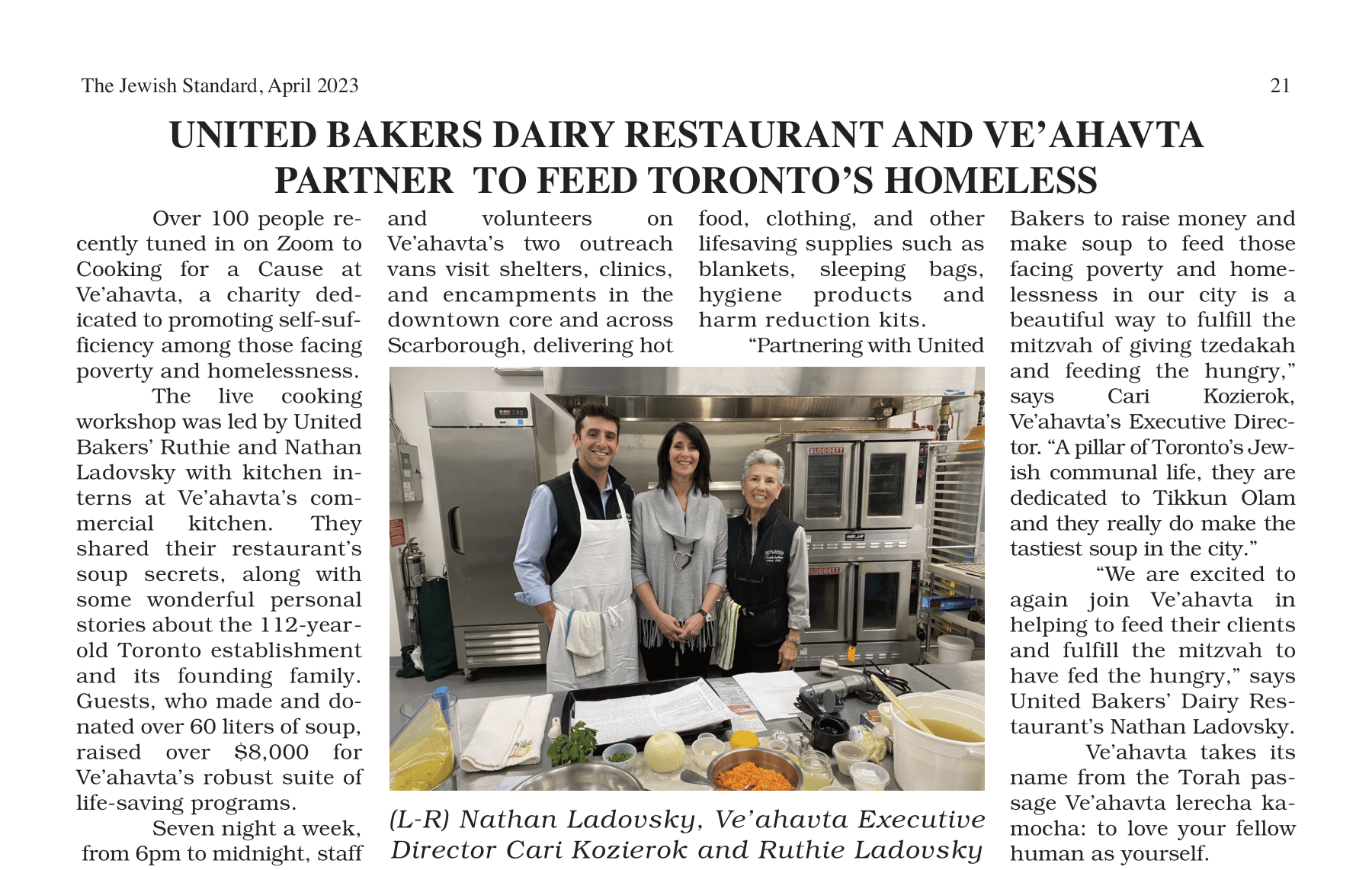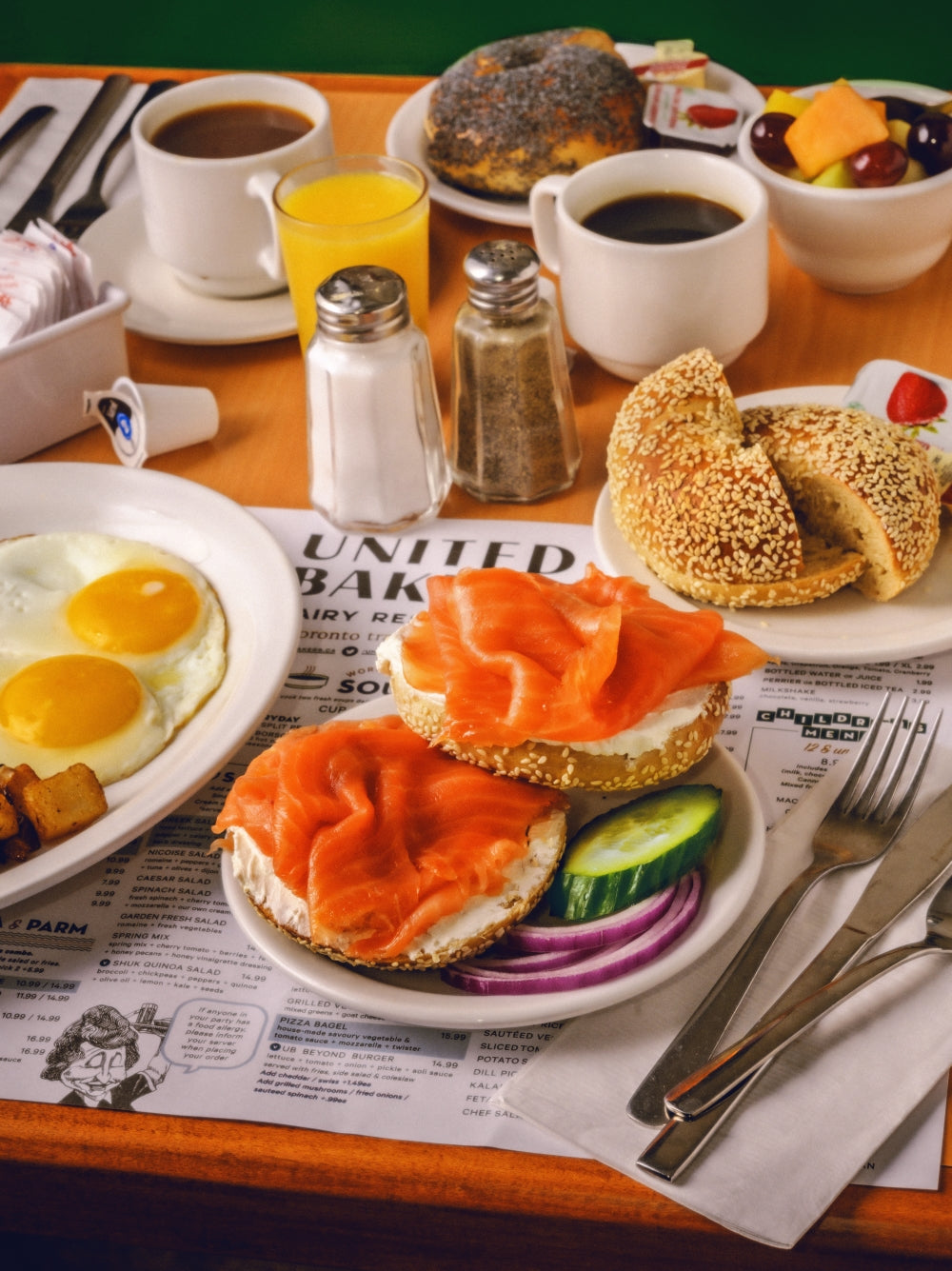
(Nathan Ladovsky (left), his aunt Ruthie Ladovsky and father Philip Ladovsky, the faces of United Bakers Dairy Restaurant, stand before a 1920s era photograph of the family business that hangs at their current location. Taken May 2019, courtesy of Aaron D’Andrea of Metroland Media.)
How many years of experience outside the business do you recommend?
What do you enjoy doing most in your family business?
What do you still find challenging when running the business?
But the biggest challenge is maintaining consistency. Our customers know us and love us for our products and our services. If that in any way wanes, we will no longer be able to command the same market share that we currently benefit from. Making sure that we can systematically provide the same exact soup, the same exact service while improving on things like the guest experience, modifying the menu and making sure the property is in good condition, but keeping that feeling there, that’s very hard to do.

(Nathan (top left) and Philip (furthest right) celebrate with staff the evening of July 15, 2021 – prior to re-opening the dining room after a lockdown.)
What has it been like to lead your business during the pandemic?
I can see the joy in serving customers in your eyes! It seems like you also do a lot of client interactions. Is there another family member in the back handling the operations?
My father is still very involved in our back of house operations – and while we have streamlined our accounting and bookkeeping practices – something that used to take several hours a day – my father still checks our bookkeepers work with a fine-toothed comb – but it’s something I hope to continue to take off his plate.
If you have two people in the senior generation doing these roles and they are both phasing out, can one person in the succeeding generation really take it on themselves? The answer is yes, but it requires a lot of commitment from the person coming in, and a little bit of flexibility from the organization to accommodate the different styles. I’m not my aunt and I’m not my father. I’m Nathan. As much as I aspire to provide the same level of hospitality, the way I talk is different from the way she talks. I’m not going to hug and kiss you the way she does, but I will give you a handshake or an elbow bump with the same loving warmth. It’s important to both be grateful for the established way of doing things and be patient as both you and the business adjust to each other.
When and how did you figure out your role in the business?
I still wash dishes! I am constantly evolving in my role as the business grows. I knew from a young age that I wanted to operate United Bakers, but I didn’t have a roadmap for the formal training and practical experience that would be required to properly assume a leadership position.
After Undergrad, I came back to the business and moved from being a line-cook, to a kitchen manager, to a dining room manager. It was there that I found I was hitting a ceiling. My understanding of accounting and corporate finance was not strong, and I knew I could benefit from a formal education.
I had applied to several Law Schools and on the day I received a rejection letter from my last choice, my father took me to hear Isadore Sharp speak – the founder of the Four Seasons. Mr. Sharp spoke about his first hotel – The Thunderbird – and his experience running it. And I realized, you can be a professional in hospitality. It’s ladies and gentlemen serving ladies and gentlemen and that it’s a noble trade!
After that, I applied to the Hotel School at Cornell University and to this day I think they placed my application in the wrong pile because I don’t know how I got in. The school gave me the tools and frameworks I needed to turbo-charge the business upon return.
Regardless of title, I think it important to have a deep understanding of every element of the business – and I’m thankful to have the lenses of a formal education and deep family history to view it through. When I wash dishes, I’m asking my team for their suggestions and we’re constantly thinking of ways to improve on how we’re doing things. While my current title is COO, my primary role is to drive growth while maintaining consistency – and it’s something I’m still figuring out how to do.

(Nathan (left) his Aunt Ruthie (center) and middle brother Jacob (right) take a moment from cooking in October, 2008)
Besides you, are there other family next-gens who are helping to lead the company?
The middle brother, the one in Israel, had a lot of hands-on experience. He knows what it means to do our big holiday catering orders. He makes the food. He fits right into the kitchen and he integrates very seamlessly with the back of house team. He’s very dependable.
My youngest brother is very business savvy. He’s an excellent marketer and an excellent communicator. Though he’s never worked in our kitchen the way my middle brother has and I think there’s a unique understanding of the business that comes from working in the kitchen – he is the one who pushed us towards e-commerce and it was a tremendous success!
My cousin also helps us with large catering orders and holiday rushes and it’s really nice when the whole family comes together to support the business. When we’re all hands on deck, it creates an energy that you just can’t explain.
Research shows that only 30% of family entrepreneurs make it to the 2nd generation, 12% to the third, and only 3% to the fourth generation and beyond. How does your family business prepare next-gens to lead?
It’s a lived experience that my father and aunt worked hard to share with me – one that extends outside the business.
How I was prepared for this was through open community involvement. I’m grateful that my father and my aunt are very involved in the community via philanthropy, volunteering, and religious life. Recently my aunt and I led a virtual soup making class, where all the soup that was made was later distributed to the city’s homeless population through the help of a community partner. It’s events like these – where we connect with our family, our community, and our city, that have really prepared me to take a leadership role in the business.
That, and going to my aunt’s house for dinners, seeing how she puts out a spread of great food. Her sense of hospitality is something I try to emulate all the time. Outside of working at other restaurants and my education, that’s kind of the preparation I’ve had – it’s by no means formal but definitely necessary.
My brother in the military said to me, “Any mission that they plan, the first thing that they would plan is an exit strategy. Never go on a mission without having an exit strategy.” My father and my aunt entered this business with the goal of growing it and we now find ourselves at a point where we are figuring out the exit strategy together. One of my goals is to standardize elements of the business so that when it comes time for me to pass it down to hopefully the next generation, we have a bit of a clearer roadmap of how to do it.



